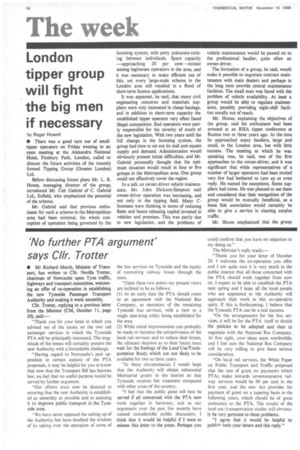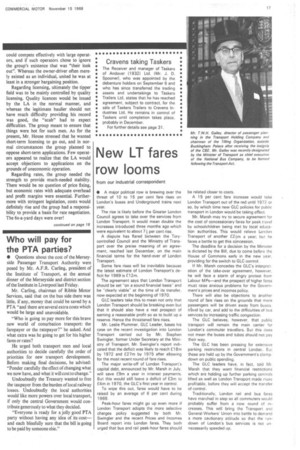London tipper group will fight the big men if necessary
Page 18

Page 19

Page 20

If you've noticed an error in this article please click here to report it so we can fix it.
by Roger Howell • There was a good turn out of smalltipper operators on Friday evening to an open meeting at the Alexandra National Hotel, Finsbury Park, London, called to discuss the future activities of the recently formed Tipping Group (Greater London) Ltd.
Before discussing future plans Mr. L. R. House, managing director of the group, introduced Mr. Celt Gabriel of C. Gabriel Ltd., Enfield, who emphasized the potential of the scheme.
Mr. Gabriel said that previous enthusiasm for such a scheme in the Metropolitan area had been minimal, the whole conception of operation being governed by the licensing system, with petty jealousies existing between individuals. Spare capacity —approaching 20 per cent—existed among legitimate operators in the area, and it was necessary to make efficient use of this, yet every large-scale scheme in the London area still resulted in a flood of short-term licence applications.
It was apparent, he said, that many civil engineering concerns and materials suppliers were only interested in cheap haulage, and in addition to short-term capacity the established tipper operator very often faced illegal competition. Bad operators were partly responsible for the severity of much of the new legislation. With two years until the full change in the licensing system, the group had time to set out its stall and equate supply and demand. Administration would obviously present initial difficulties, and Mr. Gabriel personally thought that the optimum situation would result in four or five groups in the Metropolitan area. One group could not effectively cover the region.
In a talk on owner-driver vehicle maintenance, Mr. John Dickson-Simpson said owner-driver operation was increasing, and not only in the tipping field. Many Clicensees were thinking in terms of reducing fleets and hence releasing capital invested in vehicles and premises. This was partly due to new legislation, and the problems of vehicle maintenance would be passed on to the professional haulier, quite often an owner-driver.
The formation of a group, he said, would make it possible to negotiate contract maintenance with main dealers and perhaps in the long term provide central maintenance facilities. The small man was faced with the problem of vehicle availability. At least a group would be able to regulate maintenance, possibly providing night-shift facilities usually out of reach.
Mr. House, explaining the objectives of the group, said his enthusiasm had been aroused at an RHA tipper conference at Buxton two or three years ago. At the time he approached many hauliers, large and small, in the London area, but with little success. The meeting at which he was speaking was, he said, one of the first approaches to the owner-driver, and it was significant that while representatives of a number of larger operators had been invited very few had bothered to turn up or even reply. He named the exceptions. Some suppliers had come. He was pleased to see them and considered that their recognition of the group would be mutually beneficial, as a bona fide association would certainly be able to give a service in clearing surplus traffic.
Mr. House emphasized that the group could compete effectively with large operators, and if such operators chose to ignore the group's existence that was "their look out". Whereas the owner-driver often merely existed as an individual, united he was at least in a stronger bargaining position.
Regarding licensing, ultimately the tipper field was to be mainly controlled by quality licensing. Quality licences would be issued by the LA in the normal manner, and whereas the legitimate haulier should not have much difficulty providing his record was good, the "scab" had to expect difficulties. The group meant to ensure that things were hot for such men. As for the present, Mr. House stressed that he wanted short-term licensing to go out, and in normal circumstances the group planned to oppose short-term applications. Few operators appeared to realize that the LA would accept objections to applications on the grounds of uneconomic operation.
Regarding rates, the group needed the strength to provide much-needed stability. There would be no question of price fixing, but economic rates with adequate overhead and profit margins were essential. Furthermore with stringent legislation, costs would definitely rise and the group had a responsibility to provide a basis for rate negotiation. The 6s-a-yard days were over Mr. House emphasized that though the group was a limited company it would be non-profit making, initially operators paying so much per vehicle per week to cover administration. Any surplus arising would go towards the eventual provision of group maintenance facilities. Operators were to be allowed the full rate for all traffic passed through the group, though the usual 5 per cent reduction for weekly payments would apply. It was also essential to appreciate that the group was no take-over bid. The original members were all owner-drivers and Mr. House stressed that he himself had only a modest fleet. Committees would be elected as required, committee membership being on an annual basis.
The group, said Mr. House, already had sufficient promised support even before the meeting. Rate-cutters and fly-by-nights were not welcome. Indeed one of the fundamental aims of the group was to drive the "scabs" Out.
Came question time, and an operator asked how the group would operate on a wide variety of licensing conditions in existence. Mr. House replied that obviously some standardization of licensing would be essential to cover the period up to operators' licensing. Six founder members had applied for variations to their licences in order to cover haulage for the group and no objections had been received.
A Basildon operator asked whether firms were committed to operate for the group full time. Again it was a question of administration. Many hauliers would definitely wish to maintain existing customers and work through the group only when their capacity allowed. Such firms would still have the weekly levy per vehicle, but with fleets above a certain size it would be possible to negotiate subscription rates.
An intense discussion developed over sub-letting, it being agreed that the small man generally came off badly when Working through agencies. Mention was made of the ridiculous rates offered on return-load traffic—normally materials in, muck out— and Mr. House stressed that the group meant to fight against poor rates and allied malpractices. Certainly it was to be realized that tipping work was now rarely profitable on a one-way basis, but returnload working had to be efficiently organized.
One of the few representatives of a larger operator present, Mr. Phil Crate (P. Crate Ltd., London, SW19) commented that to him the group still seemed to approximate to an agency. Mr. House reiterated that the group was to be non-profit making and would certainly not countenance rate trimming. Although disappointed at the lack of support from the larger firms, the group was still willing to co-operate, and fully appreciated the advantages of such co-operation. Competition would be on service. Rates were low enough already and it was essential to maintain an economic level.
Asked about objections to group subscribers applying for the necessary B variations , Mr. House stated that he would welcome them. The group intended to challenge the past record of objectors, where there was a good cause to do so. Also if objectors had in the past made short-term applications these were certain to be mentioned.
Winding up the meeting, Mr. House reminded those present that the group already had sufficient initial support; applications would obviously be welcome but the committee meant to be selective in choosing new members.




















































































































